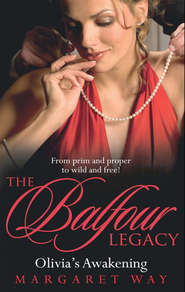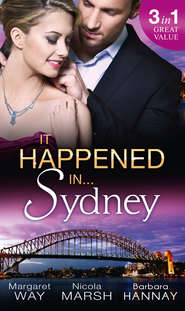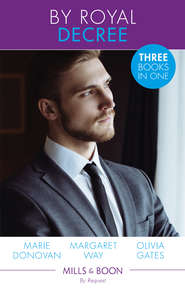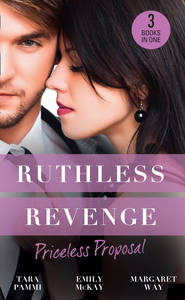По всем вопросам обращайтесь на: info@litportal.ru
(©) 2003-2024.
✖
Sarah's Baby
Автор
Год написания книги
2018
Настройки чтения
Размер шрифта
Высота строк
Поля
“Praise indeed!” Kyall had answered casually. “But wasn’t I raised thinking my future was Wunnamurra? You know that, Raoul.”
“There’s a great deal more to it—to you—than that. As we’ve already seen. I’ve heard you debate political issues with a passion. Don’t tell me you wouldn’t like to be on the front lines solving the nation’s problems. Think about it, Kyall. You’ve got the brains and the guts to make a difference. This nation is really on the move. You can be part of it.”
For a while their enthusiasm had swept him along. Of course, he’d always been interested in politics. He’d grown up talking politics. His family had always been vitally interested in a fair deal for the man on the land. A number of McQueens had played a role in public life, all of them members of the Country Party, then the National Party now in coalition with the Liberal Party currently in power.
Just as they were parting—the senator had gone off to another meeting—his uncle had asked him about his “love life.”
“Is Ruth still pushing the Claydon girl at you?” This with a long, steady look.
“Sometimes it’s very hard to get through to Gran.”
“Ever hear from that little one, Sarah? Her father was a ringer, worked in our sheds. I’ve often wondered. The two of you were quite inseparable at one time. Lord knows how it went down with Ruth and your mother. An incredible pair of snobs. Sarah, ah, yes! As beautiful a creature as I’ve ever seen.”
At any mention of Sarah’s name, anger and pain overtook him. “Sarah and I lost touch long ago. For her own reasons she wants no part of me. She’s been back in town a few times over the years to see her mother. Mostly her mother goes to see her. She’s a doctor now. A good one. The Sarah I remember was always flooded with compassion for her fellow man.”
“Sounds like you’re still in love with her, my boy. Maybe you should do something about it. Unless she’s already married. A lovely creature like that surely would be.”
“No, she’s not married, but like I told you, she no longer has the slightest interest in me.” He didn’t mention that the last time he’d seen Sarah at Tracey McNaught’s wedding some eighteen months ago, she had turned her beautiful dark eyes on him briefly. For an instant those eyes had fired up as in the old days, then turned to ice, their message unmistakable. Keep away from me.
No, Sarah wanted nothing to do with him or the McQueens anymore. Something drastic had happened to her. He didn’t know what. For a long time he’d tried to speak to her mother, only to have Muriel Dempsey shake her head and frown, her gaze fixed on some point over his shoulder. It was clear the woman didn’t want their friendship to continue. She only saw trouble. But that hadn’t stopped her from allowing Sarah to accept a McQueen scholarship to complete her education. From there, Sarah had gone on to med school.
Both his grandmother and his mother had been pleased—and enormously relieved—that Sarah had left.
“Darling, it’s all for the best. She’s a pretty little thing, but there’s something a whole lot better in store for you.” His mother had tried to soothe him. “You’re a McQueen, after all.”
A McQueen, that’s me. Why was it some days it felt so bad? Not that he didn’t know the reason. The reason was the unceremonious way Sarah had gone out of his life. The last time—the first time—they’d been together, with electricity leaping from her body to his, passion had blazed between them. Its excesses, the sheer glory and excitement of it, had left them both mute. He had always loved Sarah, but nothing like that. That was the one time they’d come together as lovers. Slipped the confines of adolescence and become adults. To this day, he was unable to forget. Unable for all his successes to pick up his life. Get married and be done with it. Have children. What the hell was he waiting for? A genuine miracle?
In all these years, there was no one who could oust Sarah from his mind, although he’d had his share of girlfriends. India Claydon was always around. His grandmother’s choice. India seemed to think that fact alone would win the day. India was of his world. She knew all the things he knew. She liked all the things he liked. It was cruel to encourage her, but he’d never really done that. His grandmother was the one who kept pushing for an engagement because she truly believed India Claydon was the right wife for him. He could see it in a way. India was “suitable” she could deal with being a McQueen wife. The big drawback was that although he was fond of her—he’d known India all her life—he didn’t love her. It was going to take him a long, long time to forget what love was like. Love was Sarah. So beautiful, so bright, so real. So complex.
His grandmother said Sarah was ambitious. He knew that; Sarah had plans. Miss Crompton had encouraged her all the way. Sarah was going to make something of her life. She was also going to look after her mother, of whom she was very protective. He came to realize afterward that Sarah had never thought for a moment that she’d marry him.
“Darling boy, Sarah knew only a simple friendship was possible between you,” his grandmother had pointed out, love and sympathy in her tones. “Your future is here, though it wouldn’t come as a total surprise to me if someday you branched out into public life. You’re a McQueen. You have the looks, the name, the money. You can always commute. Trust me on this. Sarah is from a humble background, and the press would always ferret it out. She was thrilled when I offered her the scholarship. So was her mother. For both of them it’s a dream come true. Ask Harriet Crompton. Didn’t she fill Sarah’s head with lofty ideas? It was inevitable that Sarah Dempsey would leave like this. Surely you know that in your heart. You had a childhood bond, but that’s all over. Outgrown, because it’s unworkable. I understand these days Sarah’s set her mind on becoming a doctor. I’ll see to it that she gets help. This is the way life is, my darling, and this is the way it will remain. A door may have closed, but you’ll see another one will open.”
Lots of doors had opened over the years, but in all that time Sarah Dempsey had never walked through one. She’d only had a dozen words to say to him on the few occasions he’d seen her. Once it had seemed to him she’d been almost afraid. That didn’t fit with the Sarah he knew. Another time she’d told him flatly to stay away. “Stick with your own crowd!”
Though he had taunted her cruelly in a desperate bid to get at the truth, she’d turned into a cold stranger right before his eyes. Probably he was the only one who had loved, inventing a Sarah who’d never really existed outside his own mind. When she was offered the chance to be someone, Sarah had jumped at it. That was real ambition, just as his grandmother had said. High time he just gave up.
When he arrived at the house he found his grandmother and his mother in the plant-filled solarium. High walls of glass allowed for a superb view of the garden with its huge ornamental fountain and beyond that, rolling plains to the horizon. On a small circular table in front of them sat a sterling-silver tea service with beautiful china. Unless the family was entertaining, the very grand drawing room, too elaborate in his view, and the equally grand dining room were never used. He wondered if either woman knew or cared just how much it cost to maintain a mansion of this size. And that didn’t include the home grounds. But then, they were so used to being rich, they didn’t care about anything. Or anybody. His father had lived his married life largely unnoticed, left out of family councils, never making inroads into his mother-in-law’s affections. Why the hell had he stayed? There didn’t seem to be any real feeling between his mother and father, yet the relationship was civil enough, built on the premise that no one could alter the status quo. Marriage was a serious and solemn business entered into for life. Solidarity was important for the family. No scandals. Still, his uncle Stewart had left Wunnamurra behind. So had his sister, Christine, both of them determined to find their own happiness.
Stewart had died in Malaysia. Chris, who looked very much like him, traveled the world as a fashion model. The last time he spoke with her, she was doing some fashion shoot in New York. They always kept in touch.
“I’m never coming back to that bloody place, Ky. You and Dad are the only ones I love.”
He knew his sister had sought their mother’s love, but his mother had treated Christine less than kindly, forever finding fault. God knows how many times he’d told her as much. Chris, the “perennial disappointment” and, strangely, the “ugly duckling” when she was growing up. By the age of seventeen, just as he’d predicted, Chris had turned into a swan, still hording the endless criticisms her mother had directed at her, often in front of people. Their dysfunctional relationship had made Chris a very angry young woman. But she was fine now. The talk of the town. No one minded a bit that she was six feet tall—it was actually an asset—although their mother had deplored her height for years. He must have recognized very early, probably in the cradle, that he had to be his own person. Neither his grandmother nor his mother had ever come anywhere near pushing him too far, as they had with the others. The fact was, he wouldn’t stand for it.
Like Chris, he loved his father, but he wasn’t like his father, though they both owed their height to him—he and his father were six-three—their flashing smile and the turquoise eyes. The rest of them, the dark hair, the olive skin and the bone structure, was pure McQueen. He’d had enormous advantages. He knew that. But he was no playboy. He worked extremely hard. One reason was that he liked work. Another? He wasn’t happy. So he kept himself occupied.
When he walked into the solarium, the women looked up.
“Hello, darling.” Both spoke together. What had he done to deserve this damn-near hero worship? Was it because he was the heir? Didn’t they know that didn’t matter to him?
He stared at them, silent for a moment. “Hi! What’s up?” He was nothing if not observant.
“A bit of news, darling,” his mother replied, putting her hand to her thick dark hair, which she wore very short. “Muriel Dempsey died. Apparently she dropped dead in the shop. Just like that.”
“Good God!” He felt something like an electric shock. “How awful. She couldn’t have been more than fifty-five or -six. What was it, heart attack?” He lowered himself into a chair, his mind immediately and inevitably springing to Sarah.
“So Joe said.” Now his grandmother spoke, her voice not quite as strong and self-assured as usual. She’d lost weight recently and suddenly she looked her age, instead of nowhere near it. Only the eyes remained brilliant, sharp and searching. “The extraordinary thing is, I’ve been thinking about Sarah all day.”
“So it was today?”
“Only hours ago.”
“How dreadful.” He knew genuine grief. For Muriel Dempsey and for Sarah. Muriel hadn’t had much of a life, although he’d heard through the grapevine that she’d resisted Sarah’s pleas to come to Brisbane to live with her. Muriel Dempsey had always struck him as completely unselfish. She’d probably thought she might be a burden to Sarah in some way.
“Then Sarah will be coming home. Home, sweet home,” he finished ironically.
“That’s what we’re afraid of,” said his mother, then flushed when Ruth sent her a frown.
“So what’s the problem there?” he asked, his own voice sharpening.
“We’ll be expected to put in an appearance at the funeral or send a representative. The town expects so much of us.”
An angry feeling rose from his heart to his throat. “Perhaps because we have more than enough. I can’t understand what gets into you, Mum. Aren’t you the bloody mayor? Haven’t we known the Dempseys forever? Wasn’t Sarah’s father one of our best ringers? I can’t compel you to go, but I certainly will.”
“We’ll all go,” Ruth said, signaling her daughter with her eyes. “Joe had already contacted Sarah before he rang me. She’ll be in town by tomorrow afternoon. She’ll be staying over the shop.” One of Ruth’s arthritic hands closed tightly over the other. “The funeral is scheduled for Friday. Muriel wished to be cremated and her ashes scattered over the desert like her husband’s.”
“It’s just so very tragic,” Kyall said. “Sarah’s had so much suffering in her life.”
“What do you mean?” Ruth asked very suddenly, her voice like a blade. She leaned forward in her upholstered rattan armchair as though hanging on his answer.
“Why so surprised?” His expression conveyed his reaction. “She lost her father, and now she’s lost her mother, Gran.” Emotion tightened his striking features.
He’s never forgotten her, Ruth thought. The knowledge made her feel more vulnerable and frightened than she’d ever felt in her life. What if he found out? What if Sarah suddenly decided to tell him? Well, if Sarah tried it, she wouldn’t know what she was letting herself in for.
“I did my level best to help her, Kyall. I didn’t have to pay for her education, then send her on to medical school. Sometimes I think I was a damned fool. She’s never appreciated it. One doesn’t like to speak ill of the dead, but Muriel was the same, even though I put plenty in her pocket. She didn’t have to continue to work at that shop. She wanted to.”
“Why exactly did you do it, Gran?”
Shocked, she detected an undertone of bitterness and skepticism in the way he said it. “I carried on from your grandfather and his father before him. The McQueens are philanthropists. Isn’t that the truth?”
“When it’s worth it to you.”
“Kyall!” his mother gasped, her strong-featured, aristocratic face turning pale.
“Mum, must you always be such a hypocrite?” he asked coldly. “Let it go. This news has upset me if it hasn’t upset you.”
Ruth’s glittering black gaze flickered. “I can scarcely believe that my grandson, my splendid grandson, never in awe of me or our fortune, can’t escape that girl. Did she steal your heart, my boy?” For once Ruth allowed herself to show her contempt for Sarah.











